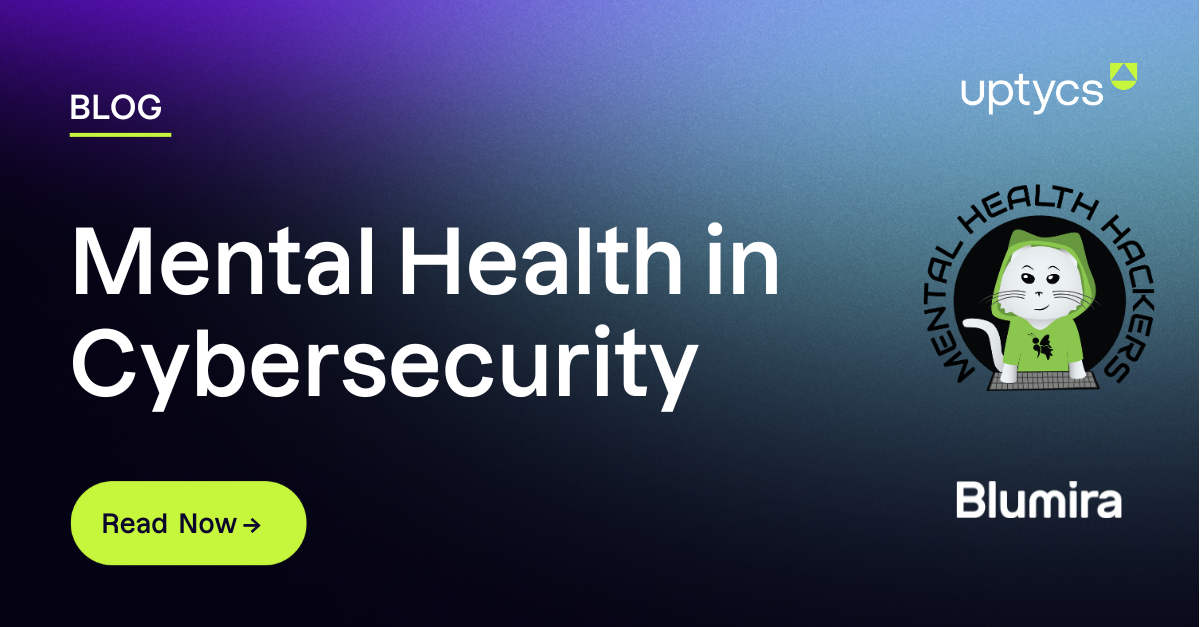Cybersecurity professionals face a challenging and ever-changing landscape filled with external threats and internal pressures. The nature of the job can lead to increased stress, burnout, and other mental health challenges. To address this issue, Uptycs hosted a LinkedIn Live event that offered practical tips on managing stress, burnout, and work-life balance.
Watch Cybersecurity Standup: Mental Health in Cybersecurity
Special guest Amanda Berlin, Lead Incident Detection Engineer at Blumira and CEO of Mental Health Hackers was joined by key members of the Uptycs' team, including Crystal Poenisch, PMM Cloud Security, Mark Bliss, Head of Integrated Marketing, and Bronwen Hudson, Social Media Manager.
Together, they explored the unique mental health challenges facing today's cybersecurity professionals and shared practical advice on how to manage these concerns effectively.
A Healthy Discussion
The event kicked off with a lively conversation about the unique pressures and challenges that cybersecurity professionals face. The growing complexity of the cybersecurity landscape, the ever-present threat of attacks, and the burden of securing sensitive data can lead to a high-stress environment. This, combined with long hours and the need for continuous learning, can often impact a professional's mental health.
A central topic of discussion during the event was the impact of burnout on cybersecurity professionals. Burnout is not just a matter of feeling tired – it’s a state of chronic physical and emotional exhaustion that can have serious consequences on one's health and well-being.
Bronwen talks about the ‘Swiss cheese’ method, which is a strategy that can help prevent burnout and safeguard your mental health. The concept is represented by a graphic of Swiss cheese with different holes in each slice. On one side of the cheese packet are all the work-related factors that can impact mental health, while on the opposite side is your mental health that you aim to protect. Each layer of Swiss cheese represents various tools and tactics that can be used, such as going for a walk, checking in with friends, taking a day off, or getting a massage.
The idea is that relying on just one tactic won't solve everything, but by layering these strategies, we can effectively protect our mental health.
The Interconnection of Personal & Professional Lives
Crystal brought up an important aspect of mental health that often gets overlooked: The interconnection between our personal and professional lives. She highlights the fact that any struggles we face in our personal lives can directly affect our performance at work, and vice versa.
Therefore, taking care of one's mental health holistically, rather than compartmentalizing personal and professional life, is key to maintaining balance.
The Importance of Hobbies Outside of Work
Amanda and Bronwen stressed the importance of having hobbies outside of work, particularly those that do not involve staring at a screen. Having non-digital hobbies can provide an essential mental break from the rigors of the job and also help reduce eyestrain, which is common among professionals who spend a lot of time on computers.
Such hobbies could include reading, gardening, painting, or even just going for a walk. Bronwen shared that she loves playing roller derby for stress release! In fact, physical sports of any kind can be great for this purpose. Getting away from work, and away from the computer, can contribute to a better work-life balance, which is crucial for mental health.
Setting Boundaries
Crystal suggested that setting boundaries between personal and professional life can be a beneficial strategy. While it's important to acknowledge that these areas impact each other, establishing limits can help manage stress and prevent burnout.
This might mean setting specific work hours, taking regular breaks, and making time for self-care activities. Crystal mentioned that she takes an hour after work to mentally break away, take a bath, put on relaxing music, and just decompress, before transitioning to ‘home mode’ for the evening.
Seeking Support
Amanda encouraged seeking support when needed, whether that's from a mental health professional, a supportive community, or resources like Mental Health Hackers, a non-profit organization she leads. This group is dedicated to educating the public, especially information security professionals, about the unique mental health risks they face.
The organization provides information and education for individuals grappling with issues such as anxiety, depression, social isolation, and eating disorders that can be exacerbated by heavy technology use. It's a reminder that nobody has to face these challenges alone, and reaching out for assistance is not a sign of weakness, but rather, one of strength and self-awareness.
Nurturing a Healthy Work Culture
Mark highlighted the importance of fostering a healthy work culture that encourages open discussions about mental health. A supportive environment can help employees feel more comfortable reaching out when they're struggling.
He emphasized that a crucial part of this is ensuring leaders are setting an example by prioritizing their own mental health and demonstrating vulnerability. He also recommended taking “microbreaks” during the workday to take a walk, go out to lunch, anything to just get away from the computer and reboot yourself.
Next Steps
The conversation around mental health in cybersecurity, and tech at large, is ongoing. We look forward to continuing this dialogue in future events, providing more resources and platforms for discussion.
In the meantime, you can watch the full recording of our Mental Health and Cybersecurity event on our LinkedIn page. We invite you to share it with your colleagues and to keep the conversation going in your own professional circles.
At Uptycs, we believe that a healthy, balanced, and supported cybersecurity workforce is a resilient and effective one. We're committed to fostering an environment that promotes mental well-being and supports our employees in all aspects of their lives.
Follow Uptycs on LinkedIn for more insights and events, and remember: Take care of your mental health – it's an essential component of your cybersecurity toolkit.







